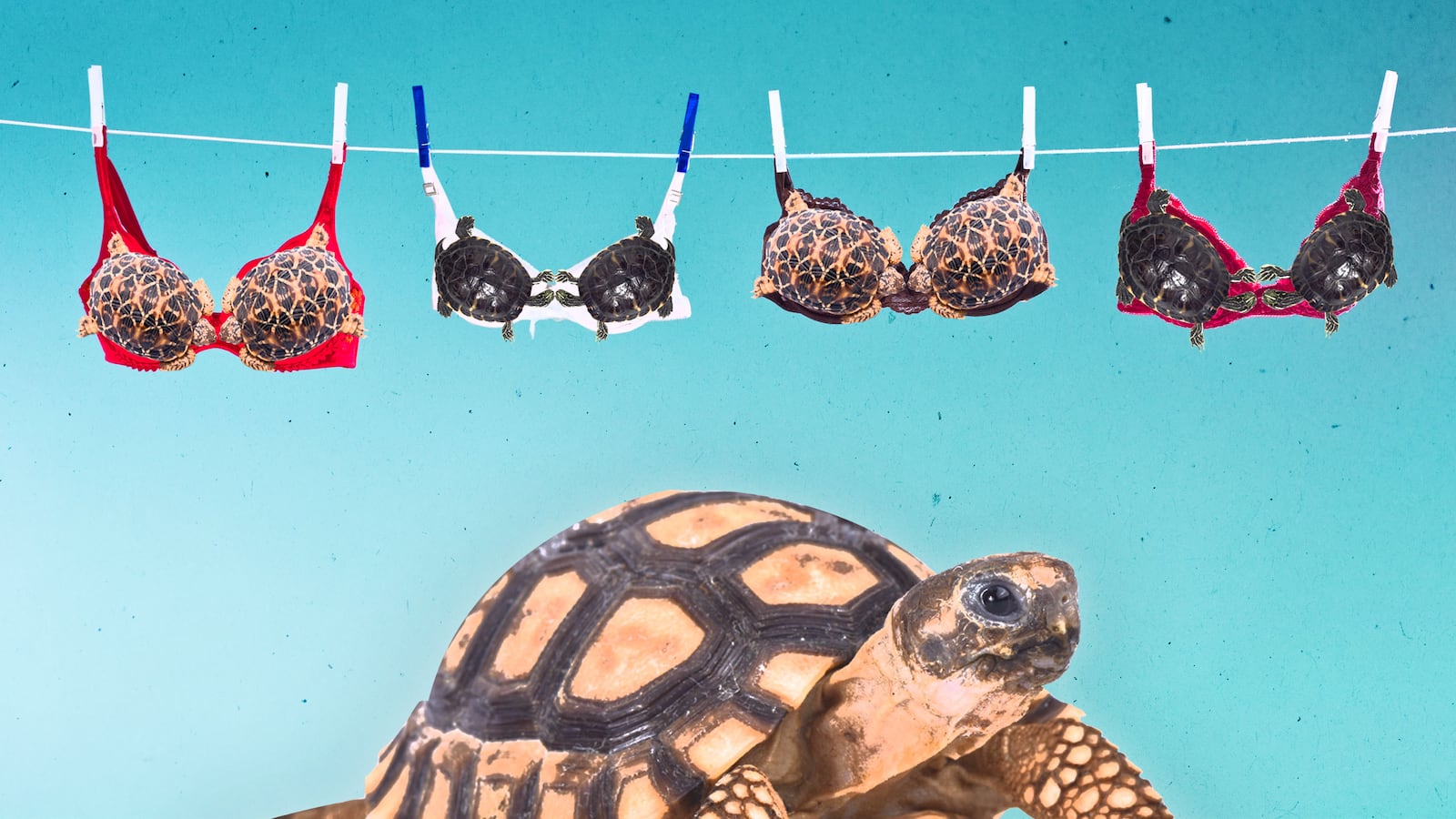About 10 years ago, a newly minted female herpetologist—the proper term used to describe scientists who study amphibians and reptiles—went to a conference in Brazil. She spied Richard Vogt, the celebrated turtle researcher whose work has earned him accolades, across the room and went to introduce herself.
“I’m from the Midwest, and he [Vogt] used to work in Wisconsin, so I knew he was a big name,” the woman, who requested anonymity, told The Daily Beast. She had just broken into the field and wanted to introduce herself, so she did.
It didn’t go as planned. Vogt immediately looked her “up and down,” she said. Then, instead of returning the introduction, he asked: “Did you bring your bikini? We’re going to be in the pool later.”
“It made me uncomfortable,” recalled the woman, who said she excused herself after the comment. “I didn’t interact with him the rest of the meeting. That guy is disgusting. He’s a sexist pig.”
“That guy” is at the center of turmoil within the normally sleepy, deeply nerdy world of herpetology, which—along with its sister field of research, ichthyology, or the study of fish—hosted its annual conference last week in Rochester, New York.
Vogt had been selected to be recognized with the Distinguished Herpetologist Award but sparked furor after using the session to present some research in front of images of women—including a doctored image of his wife—in skimpy bikinis and lewd commentary. Vogt’s award was rescinded within 24 hours, but not before igniting a conversation about sexism in science. (Vogt did not respond to an emailed request for comment from The Daily Beast.)
Prior to last week’s debacle, Vogt was a celebrated herpetologist. He’d made a variety of news-making discoveries, like the fact that female turtles were able to “talk” to their hatchlings and the role of temperature in turtle conservation in indicating sex (climate change leads to more female hatchlings). Vogt has published more than 100 papers in multiple languages and is widely considered a leading, if not the leading, turtle conservationist in the world.
His contributions to the field were so celebrated, in fact, that he earned the distinction of having a rare Mexican turtle named after him, the Kinosternon vogti.
Priya Nanjappa, the national coordinator for Partners in Amphibian and Reptile Conservation and a trained herpetologist, was at the plenary session that hosted Vogt. “I was there because I was presenting other awards in the agenda,” Nanjappa said. “But I would otherwise not have gone to the talk.”
That concern that Vogt made people, especially women, uncomfortable was made blaringly evident last week, highlighting a huge problem within the herpetology community’s highest echelons: no code of conduct, and almost little to no recognition of women or people of color.
Within 24 hours of Vogt’s award and rescission, Lori Neuman-Lee, a herpetologist and assistant professor at Arkansas State University, was instituted as the new head of the Herpetologist League’s diversity and inclusion committee.
Neuman-Lee’s appointment was hasty.
“To give you a sense of timeline: Wednesday was the initial board meeting and first day of the conference, Thursday meeting was the talk [Vogt’s presentation and honoring], and Friday morning was the emergency meeting,” Neuman-Lee ticked off. “By Friday afternoon we had made an announcement that we had rescinded the award and formed the committee.”
Neuman-Lee herself has faced sexism, she said, with people making passing comments about her abilities as a woman, and openly asking if she can do her job as a female herpetologist. “Even after I got my university appointment, I have students ask: ‘How can you have long nails and be a herpetologist? How can you wear a skirt?’”
“To be frank, I’d say the field of herpetology has been more welcoming to women,” Nanjappa said. “But there are some in the older ranks that have a sexist mentality. There are fewer women in leadership across the board. They may get the jobs over women who are more qualified. That’s a huge problem within the system.”
She and Nanjappa both said separately that while they have had “wonderful” experiences with white male mentors, there is “pervasive sexism and fear of ‘others’ in the field,” as Neuman-Lee put it.
It’s not the first time that Vogt has capitalized on the field’s lack of openness to women and minorities and faced criticism for risqué images. The same woman who dealt with the bikini comment 10 years ago with Vogt recalled that the Joint Meeting of Ichthyologists and Herpetologists’ “submission site had a big red font saying that nudity and vulgar language would not be tolerated.”
In past meetings, the source said, Vogt’s trademark has been to mix images of topless women into his talks on his award-winning discoveries. Vogt, who is based at Brazil’s National Institute for Amazonian Research, often argued the images were culturally accepted, according to the source: “These were women who were topless, with their full breast shown,” she said. “He’d say that that’s how they [the women] feel comfortable.”
But, as the anonymous source, Nanjappa, and Neuman-Lee pointed out, these images were not necessary to communicate Vogt’s points. “Surely there are other angles or other pictures than them in a bikini,” Nanjappa said. “The issue is that these are gratuitous pictures, and they’re not necessary in acknowledging the women who helped him [in his research].”
Neuman-Lee went so far as not only to skip Vogt’s session but also to counsel her female advisee not to go, because she knew what was at stake: “I had seen previous presentations,” she said. Neuman-Lee said that while she personally hadn’t dealt with harassment from Vogt, she’d certainly been aware of Vogt’s alleged history of sexual innuendo using bikini-clad women in presentations.
The Vogt story is a sign of the #MeToo movement’s far-reaching consequences beyond Hollywood and media into the STEM fields, where men have traditionally dominated research and leadership roles, with casual commentary and uncomfortable situations like Vogt’s often not only making researchers feel unworthy but scaring them away outright. In the months after the #MeToo movement’s launch, women in science emerged with their own stories of harassment, how trusted and often celebrated mentors moved from being icons and idols to demeaning comments and behavior that ultimately led many female scientists to leave the field.
Another source who requested anonymity spoke of a former fellow herpetologist who directly dealt with Vogt. “Dick Vogt made lewd comments to her at a talk several years ago,” the source recalled. “She changed her career path because of that.
“She told me recently, ‘I’ve always wondered what would have happened if I had not changed my career path.’”
So how did this situation come about? Neuman-Lee said the president of the Herpetologist League has historically been tasked with single-handedly choosing a candidate for the distinction. With the new rules the committee put in place in the aftermath of the Vogt hoopla, a board will have to review the president’s choice for honors. But, crucially, the president still retains the power to make the initial choice for the distinction, Neuman-Lee said.
That appears to be true: Henry Mishinsky, a professor at the University of South Florida and the vice president of the Herpetologist League, confirmed to The Daily Beast in an email that the current president, David Sever, was solely responsible for choosing the researcher who was to receive the distinction. (Sever did not return calls or emails for comment.)
But from here it gets muddy. Mishinsky said his role as chair of the joint meeting meant that he’d been made aware of the “suggestive slides by a female from the professional agency that organizes our meeting.” “I approved the adding the blue boxes to block the suggestive portions of the slides, but still allow [sic] Dr. Vogt to use them as part of his prepared presentation,” he said. “When I did see the slides, I was convinced I made the correct decision.”
Mishinsky was referring to the decision to put strategically placed blue boxes over parts of revealing images, including a woman’s torso. According to The New York Times, Vogt was not made aware of the blue boxes, so when they appeared, he was “‘shocked’ and ‘flustered’... One of the women pictured was his wife.”
The provocative images weren’t solely women in bikinis, though. “You should know that his talk also included… pictures of men, including himself, with minimal clothing while working on turtle beaches that were not edited,” Willem Roosenberg, vice president of the Herpetologist League and a professor at Ohio University, said in a written statement to The Daily Beast.
A follow-up address was meant to look at sea turtle vocalizations, which included not only comments about the noises made when parakeets “kiss” (“This might be erotic to some people”) but also another comment on turtle mating behavior, according to the Democrat and Chronicle, the local paper that broke the story: “Males often go under females and sniff their cloaca (their reproductive orifice). I’m sorry, but that’s what they do.”
While images of the slides in question aren’t available, Nanjappa, who was at the session, said that there was an air of discomfort and resignation at the session last week when Vogt was presented for the honor. “Just before I came in, two gentlemen behind me were talking,” she said. “One said, ‘Do you think they’re going to put women in bikinis in his talk?’ [The other said] ‘Oh gosh, I hope not—but he probably will.’”
Nanjappa said she made a pact with herself: If he showed racy images, she’d leave.
It didn’t take long for the first shot to come up, censored with a blue box to hide the woman’s exposed private parts, and emblematic of Vogt’s alleged past behavior.
“He was talking about the shot in terms of his research,” Nanjappa recalled. “But it was gratuitous. They’re not necessary, they’re not demonstrating a technique. They’re [pictures of] a woman holding a turtle, or just looking at a turtle. She’s not pulling a turtle out of the trap, and they’re almost always full body shots.”
By the next image, Nanjappa walked out, tweeted, and fired up a conversation about women, sexism, and science.
“Who wants to support this guy?” asked Nanjappa, who said that only one other person left the room but that the room reverberated with sighs and groans when the bikini-clad images predictably popped up. “That’s in part because people expect it. They’re not happy about it, but they’re numb to it.”
Neuman-Lee, for her part, has focused her efforts on reforming the organization—and field as a whole—to address the concerns of women and minorities. “I’ve thought a lot about it,” she said, noting that she’s already put in efforts to make the meeting safe and inclusive, creating a uniform code of conduct that protects people while also helping them feel valued and welcome, and raising the visibility of underrepresented groups.
The vice president of the Herpetologist League, Roosenberg, said that “While during the early years of our society (1950s-’80s) this type of behavior may have occurred more frequently, in this day and time we are a highly professional scientific group… Although we cannot speak for everyone and there remains room for improvement, most people interact in a professional manner and with our pending Code of Conduct there will no longer be any tolerance for those that behave inappropriately.”
“We’re losing a lot of talent before they [young people] can even get to research, and it’s pervasive throughout science,” said Neuman-Lee.






